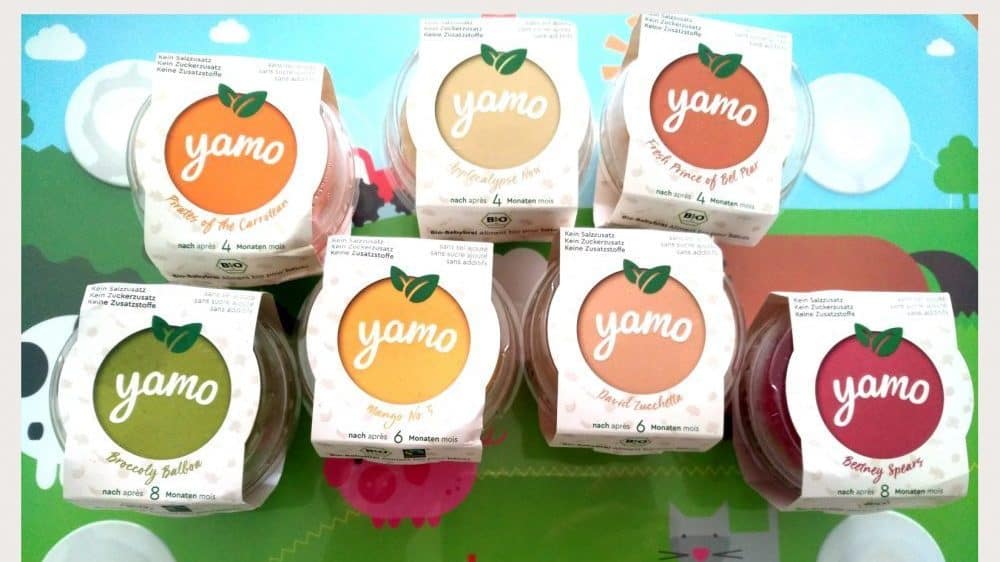Having a yummy product is always a good starting point. And if it fits well with the megatrend of healthy living, that’s even better. But a key element to the success of a brand is distribution. The story of food startup yamo, which just raised EUR 10.1 million, offers some valuable lessons.
On a Saturday afternoon in 2017, Tobias Gunzenhauser is handing out samples in one of Zurich’s hippest organic food stores. It’s baby food, but unlike the brown goo in glasses that babies all over the world struggle to swallow, much to the chagrin of their parents, it’s fresh and tasty. Customers like the samples, but when they hear the story behind it, they love it. Again and again, Tobias explains patiently that his puree is preserved through high-pressure processing (HPP) that kills harmful bacteria but leaves vitamins intact, whereas traditional baby food is sterilized by heating it up to 120 degrees, which kills vitamins, taste, and color. Tobias Gunzenhauser is the CEO of yamo. He co-founded the company in 2016 with Luca Michas and José Amado-Blanco.
In hindsight, some innovations are very obvious, and their path to success appears to be a given. The trend towards healthy living is nothing new. Do young parents who care about healthy food want their children to eat healthily? Of course they do, and they are willing to pay a premium for an organic and fresh alternative to traditional products that might have been sitting on a shelf since before their baby was born.
Our investment hypothesis as we participated in yamo’s Series A financing round was that the very large target market (baby food is a CHF 80 billion business) is dominated by big brands that didn’t come up with an innovation for decades.
Our investment hypothesis as we participated in yamo’s Series A financing round was that the very large target market (baby food is a CHF 80 billion business) is dominated by big brands that didn’t come up with an innovation for decades. A perfect opportunity for a startup to change things. This wasn’t just about a healthier product, but also about a distribution model that allows gaining insights into what young parents actually want. And yamo has found the formula to do this. This, in turn, even led to the specialized food and agritech VC Five Seasons based in Paris investing in yamo. But again, some success stories seem so blatantly obvious that it is easy to forget how much work it was to get the winning formula right in the first place.
After having sold two dozen cups of his product, a store clerk tells Tobias that he sold more in one day than they have sold in three weeks. The young entrepreneur realizes that the success of his product depends too much on the people working in a store and that he can’t do the sales himself. A decision is taken: yamo will be an online brand.
“If you want to build an online community, you can’t just always shout, you have to listen too”, he explains. With this approach, the brand is able to gain the trust of young mothers and grow. Today, yamo has 18’000 followers on Instagram. Market leader Hipp has 49’000, but that’s less impressive if you consider that it is a company with estimated sales of around EUR 1 billion.
Targeted marketing is key for yamo, as baby food isn’t something you’d just google. Freshness, no additives and no added sugar are key parts of the brands philosophy, as is giving back: yamo contributes to the NGO Welthungerhilfe and has already supported 86’000 children in rural India. And with tongue-in-cheek names for their baby food like “Applecalypse Now” or “Broccoli Balboa”, there is also an element of fun to it.
By now, yamo is also available in select stores of big retailers such as Coop in Switzerland (CHF 30 billion of sales) and Edeka, Germany’s largest food retailer (with more than EUR 50 billion of sales). Since yamo’s products, unlike sterilized baby food in glasses, have to be kept refrigerated, the retailers actually had to install refrigerators in the baby food aisles. This is evidently quite a concession and investment, but it paid off: In the first Coop stores that tested the approach, yamo quickly became the best-selling product in the category. This, in turn, convinced management to roll it out to more stores.
Asked about how the startup was able to secure a relationship with such large retailers, Tobias shrugs. “They reached out to us via email”, he says. Having already established good traction with its online model, they were in a much better position to negotiate than if they had just started out from scratch. And Tobias sees this cooperation as very important, even if the margins in direct sales are better. “Today, clients expect to be able to buy a product where and when they want.”
yamo has increased the variety of products it offers, not just with different ingredients, but also different packaging. In addition to the cups, it now also sells pouches of fruit puree, which are aimed at older children and already account for half of the sales. And just recently, they’ve added non-dairy yogurt, a first in this category of baby food. The idea behind the line extensions is to increase customer lifetime value. Next on the expansion plan is increasing geographical reach to France and Benelux, the first tests are scheduled for the coming months.
Tobias, Luca and José started with a great idea, and they’ve encountered their share of skeptics on their way. And even if they’ve come quite a long way, this might only be the start of their journey. “We want to become the Innocent smoothies of children’s food”, Tobias explains. When the brand Innocent started with fresh fruit juice, people laughed about their idea too. Today the company dominates the market with a share of 60%, says Tobias. When Coca Cola bought the brand in 2013, Innocent was valued at an estimated GBP 320 million, according to the Financial Times.
“We were always told that fresh baby food is just too complicated”, Tobias remembers. That view has shifted dramatically now, also due to the success of yamo and its competition in the US. Some buyers of retailers even told him that in 5 years, the only place where you will still find sterilized baby food in glasses will be hard discounters. It looks like there is a bright future for fresh baby food.
Written by
WITH US, YOU CANCO-INVEST IN DEEP TECH STARTUPS

Verve's investor network
With annual investments of EUR 60-70 mio, we belong to the top 10% most active startup investors in Europe. We therefore get you into competitive financing rounds alongside other world-class venture capital funds.
We empower you to build your individual portfolio.
More News
11.03.2021
We’re now called Verve Ventures
Europe’s leading digital startup investment platform formerly known as investiere is called Verve Ventures. Verve Ventures has become one of the most active venture capital firms in Europe.
05.02.2021
Getting access to the best startup investment opportunities
As the returns of startup investments are predominantly determined by a few rare successes, getting access to the best opportunities is quintessential. This is more difficult than it sounds.
04.07.2019
Yamo (Baby Food): Series A
Yamo has raised funds from Verve Ventures, Ringier Digital Ventures and b-to-v Partners.
Startups,Innovation andVenture Capital
Sign up to receive our weekly newsletter and learn about investing in technologies that are changing the world.




